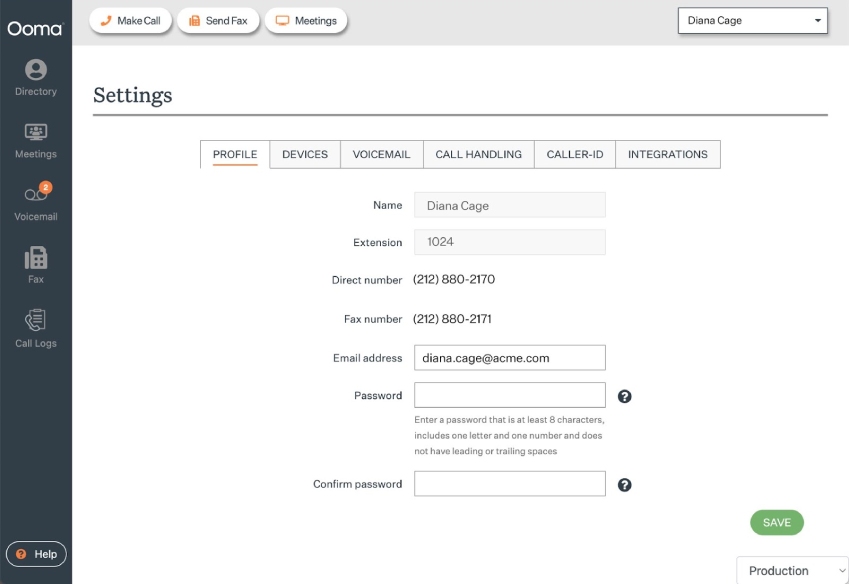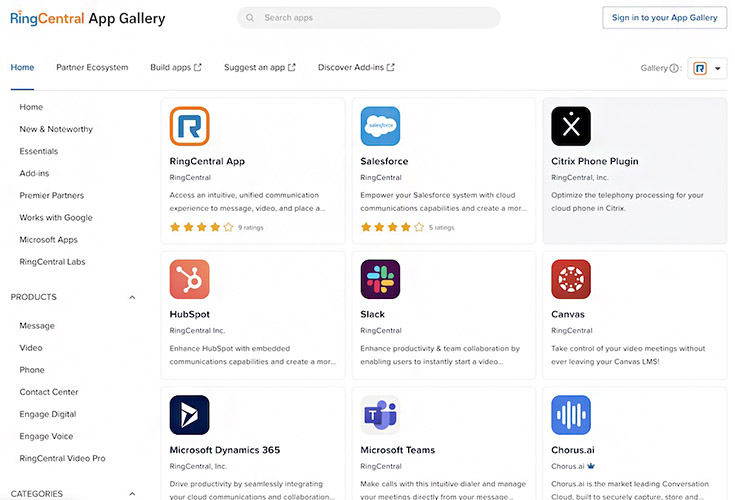Voice-over-internet-protocol (VoIP) phone systems go far beyond the capabilities of traditional telephony by providing a suite of calling features and collaboration capabilities with affordable pricing. Since they rely on the internet, users can make calls from anywhere, enjoy clear voice quality, and make flexible configurations. Read as we explain everything about VoIP phone systems and how you can use them to ensure efficient communications.
Top VoIP Phone Systems Compared
VoIP Phone Systems | Monthly Starting Price (per User) | Key Features | Free Trial | Learn More |
|---|---|---|---|---|
Ooma: Best for Home Office Use | ||||
| 30-day money-back guarantee | or | ||
 | RingCentral: Best for Call Management | |||
$30 |
| 14 days | or | |
Nextiva: Best for Collaboration | ||||
$25 |
| ✕ | or | |
Grasshopper: Best for Voice-only Interactions | ||||
| 7 days | or | ||
 | 800.com: Best for Virtual Phone Numbers | |||
$23 |
| ✕ | or | |
 | GoTo Connect: Best for International Calling | |||
$26 |
| ✕ | or | |
Google Voice: Best for Solopreneurs | ||||
| or | |||
How VoIP Phone Systems Work
VoIP phone systems use a packet-switching technology called voice-over-internet-protocol (VoIP), which converts audio signals into digital data, facilitating real-time communication over the internet. A service provider acts as an intermediary that directs calls to the right destination using the recipient’s phone number or designated IP address. The diagram below illustrates how voice is transmitted through VoIP.
A cloud-based business phone service works across various devices, including computers, smartphones, IP phones and even analog phones connected via a VoIP adapter. To use VoIP, you need a subscription to a VoIP service provider, which will supply all the necessary phone features to your device.
These services often come with a virtual phone software, known as a softphone app, which you can install on your desktop or mobile phone. Alternatively, you can access the service through a web browser. Once your device is connected to the internet, you can make calls and configure your phone settings.
VoIP Phone Systems vs Landlines
VoIP phone systems are often compared with landlines, as both are used for voice communications. However, each option varies based on where the phone infrastructure is located, how connections are established, the pricing structure, and the feature set. Our comparison below highlights their key differences.
VoIP Phone Systems | Landlines | |
|---|---|---|
Installation cost | ✕ | $100-$500 |
Average Monthly Cost | $10-$50 | $20-$80 |
Technology Used | Internet | |
Key Features | Advanced call management, videoconferencing, and instant chat | Basic call features |
Device Compatibility | Web browsers, desktops, smartphones, and IP phones | Analog phones |
Types of VoIP Phone Systems
There are two main options for setting up a VoIP system: cloud-hosted and on-premise. Their key difference lies in whether you want to manage your own phone infrastructure internally or have a third-party provider host it for you. Here’s a quick overview of how each type works:
- Cloud-hosted VoIP: This is a popular alternative to traditional landlines as it is scalable, easy to install, and has a cheaper upfront cost. A service provider handles the equipment upgrade and maintenance, so you just need to pay and activate the service to start making calls. This is particularly suitable for those seeking a VoIP phone system for small business use.
- On-premises VoIP: Like landlines, on-premises VoIP systems involve installing PBX Private branch exchange equipment within the business premises. This gives you full control of your phone system by configuring it based on your specifications and security needs. The downside is that you have to cover the hardware cost and maintenance. This setup is ideal for businesses that prefer to manage their phone data rather than relying on a cloud-based provider.
Key Features of a VoIP Phone System
VoIP systems offer a wealth of features to streamline phone communication. As you seek the right service provider, it’s important to know the available features and identify which ones you should prioritize.
Call Management
The best VoIP small business phone system offers more than a way to make and receive calls. They include a call management system that allows you to configure your company’s call routing strategy and improve the overall caller experience. To manage call flow efficiently, here are popular VoIP phone features you should consider using:
- Auto-attendant: An automated menu system answers general business information and uses voice prompts to guide callers to the right agent or department.
- Call forwarding: Redirect incoming callers to another number, device, or voicemail.
- Caller ID: Manage your company’s inbound and outbound caller IDs to display the specific information you want to show when calling a lead or customer.
- Call queuing: Place callers in a queue and inform them of the estimated wait time before they reach the live agent.
- Call logs: Record all key information about a call, including caller ID, date, time, and duration.
- Call recording: Capture phone conversations, which are then stored in the cloud or your computer.
- Music on hold: Upload custom music or choose a prerecorded track that callers will hear after placing their calls on hold.
- Ring groups: Route incoming calls to multiple employees so no call gets unanswered.
- Visual voicemail: Access voicemails in an email-like interface, with options to transcribe and replay voicemail messages.
- Analytics and reporting: Track call data in real-time and gain high-level insights into the quality of service offered and trends in customer needs and team performance.

Ooma allows users to configure their call settings in a web browser. (Source: Ooma)
VoIP providers such as Ooma offer up to 50 standard phone features with their monthly plans. Upon signing up, you get a business phone number for free and have the option to select a local or toll-free number.
Unified Communications
Many VoIP phone system providers come with unified communications (UC) capabilities. They go beyond voice calls by integrating video, chat, SMS, and e-fax in one platform. While UC packages are more expensive than basic VoIP services, they deliver value for money by offering all communication channels under one provider. If a UC solution appeals to you, here are the features to watch out for:
- Conference calling: A conference call is an audio-only meeting room where you can invite multiple team members using a single phone line.
- Videoconferencing: Host online meetings with your team members where you all meet face-to-face through your webcams in a conference-like setting. The maximum attendee count varies from provider to provider.
- Instant messaging: Chat with individual users or invite team members in topic-specific channels and organize conversations in workspaces.
- Business texting: Send and receive text messages with your clients and partners using a dedicated business number. Some providers support bulk text messaging for marketing campaigns.
- Collaboration tools: UC platforms function as a virtual workspace where teams can send files, share calendars, and join video calls. Providers like RingCentral even come with project management features.

Host unlimited video meetings within the Nextiva platform. (Source: Nextiva)
UC providers like Nextiva offer an integrated workspace for voice calling, video meetings, and instant messaging, providing teams with multiple ways to communicate. Its flagship feature, threaded conversations, combines all interactions in a single view regardless of the channel used, so you get a complete view of previous conversations.
Integrations
VoIP phone systems integrate with various third-party software, allowing users to access information within the platform without switching between apps. It decreases manual processes from workflows and enables you to properly manage customer data. When a customer calls, it’s easy to pull up their accounts quickly, answer their questions, and resolve their queries without placing them on hold.

RingCentral has a dedicated library of its third-party integrations. (Source: RingCentral)
Modern VoIP providers have built-in integrations across various categories, including customer relationship management (CRM), productivity, and marketing automation. One notable example is RingCentral, which features the largest ecosystem of third-party apps and boasts over 400 business solutions on its website.
Benefits of VoIP Phone Systems
VoIP systems provide much more than just voice calls. They deliver a wealth of advantages to your business, including lower overhead costs, streamlined workflows, and happier customers. To know more about this ever-evolving cloud technology, we outlined the reasons why you need to invest in the best VoIP phone systems for small businesses.
VoIP service providers manage and store everything online, eliminating concerns about installation and maintenance costs. Some providers, like Ooma, offer a free-forever plan, while monthly paid plans range between $10 and $75 per user. Discounts are available for annual subscriptions and large user groups.
You can also find providers like Vonage with an a la carte model and pay-as-you-go pricing, so you only pay for the features you need. A provider like Grasshopper follows a fixed-rate monthly pricing structure, regardless of user count. These flexible pricing options let you easily add and remove users as needed and provide more control over your expenses.
VoIP providers offer lower international call rates, with per-minute fees typically just a few cents. Unlike traditional landlines, VoIP systems make international calls significantly cheaper by routing them over the internet instead of using expensive long-distance networks. They also charge a small monthly fee for local numbers in other countries, allowing your business to create a local presence while giving customers a more affordable way to reach your business line.
Call routing systems like auto-attendants empower customers with self-service options, allowing them to quickly find the information they need without waiting in a queue. Skill-based routing speeds up problem resolution by connecting callers to the right agents, reducing follow-ups. You can also identify trends in caller behavior through real-time analytics and quickly access customer data through CRM integrations.
VoIP systems enhance your business’ professional image by offering toll-free or vanity phone numbers. These numbers are associated with established and credible companies, creating the impression that you’re running a large and legitimate operation.
Professional phone features, such as hold music, call routing, and extensions, enable solopreneurs and startups to manage incoming calls without hiring additional staff. VoIP services for freelancers enable individual users to handle multiple clients professionally. Most providers also offer add-on services like live answering and professionally recorded greetings to further enhance your brand’s credibility.
The flexibility of cloud phone systems allows users to communicate and collaborate seamlessly, whether working remotely or from home. While connected to the internet, you can manage calls, host video meetings, send faxes, and forward voicemails from your smartphone. Send inbound calls to specific devices after business hours and set up ring groups for distributed teams to ensure calls are properly routed and received.
VoIP for small businesses centralizes all communication tools in one place, reducing the need to juggle multiple apps and devices. Integration with existing tech tools enhances work productivity by optimizing workflows. AI-powered features like call summaries automate routine tasks by capturing key moments, so there’s no need to listen to an entire conversation.
Considerations When Choosing a VoIP Phone System
The best VoIP phone systems vary in cost, feature inclusions, and scalability. When looking for a service provider, check the features that cater to your unique business needs and consider the limitations you might encounter. Here are factors to consider as you explore different provider options for your VoIP system:
- Type of phone system: The type of phone system you need will depend on whether you want your VoIP system hosted within your business or by a third-party service provider. Note that an on-premise implementation will require a huge overhead cost and a dedicated IT staff. This is ideal for companies that want to maintain full control over their security infrastructure and data privacy. For those who want to use the cost benefits of cloud technology, a cloud-based phone system is a better choice.
- Payment model: Pick a payment model that fits your business needs, call volume, and budget. Small business VoIP phone systems use a tiered pricing model that charges based on the number of users. Providers like Grasshopper charge a flat monthly fee for a specific number of extensions and phone lines. Others offer a pay-as-you-go VoIP plan, where you pay only for the minutes used, or a monthly package with a fixed number of minutes each month.
- Calling features: Evaluate your calling needs to determine which provider has the best overall features for your business. For example, companies dealing with moderate call traffic should choose a provider with robust call management capabilities to manage inbound and outbound call flow effectively. If you’re looking for an all-in-one solution for your remote team, look for a VoIP service with UC capabilities like video meetings and collaboration tools.
- Security: Each business has different security needs, but all should take necessary measures to avoid data breaches and noncompliance. If your calls involve sensitive data, you’ll need enterprise-grade VoIP security features like multifactor authentication, role-based permissions, and data protection.
Businesses with different compliance demands should seek a provider with global certifications. Top certifications include the Health Insurance Portability and Accountability Act (HIPAA) and Service Organization Control (SOC).
- Reliability: VoIP providers maintain a service level agreement (SLA) to guarantee clients that their service remains reliable up to a predefined percentage. A reliable base is a 99% uptime, but most providers go beyond by offering up to 100% guarantees. Ask your provider about their uptime SLA to ensure you’re getting the best quality service from them.
Frequently Asked Questions (FAQs)
Internet dependence and cybersecurity are two major disadvantages of VoIP. It relies entirely on internet connectivity to facilitate communication. VoIP is also prone to cyberattacks, where malicious actors may try to steal confidential data and disrupt business operations.
No, VoIP providers offer a softphone version of their software, which you can download for your desktop or mobile device. You can also access it directly through a web browser.
The popularity of a VoIP service varies based on users’ specific needs. In terms of comprehensive offerings and reliability, RingCentral and Nextiva are the leading providers. Google Voice, on the other hand, is more appealing to individual users and smaller businesses because of its simplicity.
Bottom Line
VoIP systems for small business use deliver flexible communication solutions that can reduce overhead costs and improve daily workflow. The type of solution you choose directly impacts your budget, customer service, team productivity, and bottom line. One piece of advice is to take advantage of free trials and demos to better assess a business phone provider. This will allow you to explore its functionalities and review the overall user experience.